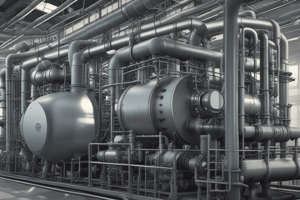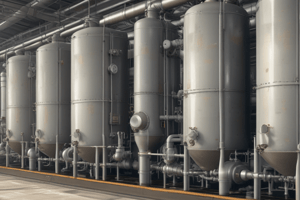Podcast
Questions and Answers
What is the primary goal of municipal potable water treatment systems?
What is the primary goal of municipal potable water treatment systems?
- To remove pathogens (correct)
- To remove dissolved gases
- To disinfect the water
- To remove solids
Why is it important to know the local water chemistry for boiler feedwater?
Why is it important to know the local water chemistry for boiler feedwater?
- To determine the color of the water
- To identify the local water utility
- To estimate the cost of water treatment
- To understand what conditions need to be treated and how to size the equipment (correct)
Where can an end-user facility located in a municipal area find information about local water quality?
Where can an end-user facility located in a municipal area find information about local water quality?
- Local hardware store
- Local restaurant
- Local gym
- Online through the local water utility (correct)
What further treatment is required for municipal water?
What further treatment is required for municipal water?
What must municipalities ensure in their potable water systems in terms of regulation?
What must municipalities ensure in their potable water systems in terms of regulation?
Apart from the parameters listed in Table 1, what else do municipal systems test for?
Apart from the parameters listed in Table 1, what else do municipal systems test for?
What is the possible process solution for acidity (low pH) in boiler water?
What is the possible process solution for acidity (low pH) in boiler water?
Which process solution is used to prevent embrittlement and foam caused by alkalinity in boiler water?
Which process solution is used to prevent embrittlement and foam caused by alkalinity in boiler water?
What is the possible process solution for dealing with chloride in boiler water?
What is the possible process solution for dealing with chloride in boiler water?
Which process solution is used to address dissolved oxygen and carbon dioxide in boiler water to prevent corrosion (pitting)?
Which process solution is used to address dissolved oxygen and carbon dioxide in boiler water to prevent corrosion (pitting)?
What process solution is effective for dealing with iron (Fe) and copper (Cu) deposits in boiler water?
What process solution is effective for dealing with iron (Fe) and copper (Cu) deposits in boiler water?
What is the possible process solution for addressing silica deposits in boiler water?
What is the possible process solution for addressing silica deposits in boiler water?
Which process solution is used to tackle suspended solids and sludge deposits in boiler water?
Which process solution is used to tackle suspended solids and sludge deposits in boiler water?
What is the possible process solution for dealing with dissolved solids causing foaming in boiler water?
What is the possible process solution for dealing with dissolved solids causing foaming in boiler water?
What is the purpose of using activated carbon in the municipal water treatment process?
What is the purpose of using activated carbon in the municipal water treatment process?
Why is it necessary to add small amounts of sodium hydroxide to municipal water for boiler use?
Why is it necessary to add small amounts of sodium hydroxide to municipal water for boiler use?
What is the primary purpose of the flocculation and coagulation unit in the municipal water treatment process?
What is the primary purpose of the flocculation and coagulation unit in the municipal water treatment process?
In a boiler, why is it important to minimize the amounts of iron (Fe) and copper (Cu) in the water?
In a boiler, why is it important to minimize the amounts of iron (Fe) and copper (Cu) in the water?
What is the purpose of using activated charcoal filters and degasifier towers in a boiler?
What is the purpose of using activated charcoal filters and degasifier towers in a boiler?
What is the primary purpose of using sand filters and activated carbon in the municipal water treatment process?
What is the primary purpose of using sand filters and activated carbon in the municipal water treatment process?
What is the primary reason for the pH adjustment of municipal water when used in boilers?
What is the primary reason for the pH adjustment of municipal water when used in boilers?
Why is it important to remove residual chlorine from the municipal water before using it in boilers?
Why is it important to remove residual chlorine from the municipal water before using it in boilers?
What is the purpose of the flocculation and coagulation unit in the water treatment process?
What is the purpose of the flocculation and coagulation unit in the water treatment process?
Which method is commonly used for disinfection in municipal water treatment processes?
Which method is commonly used for disinfection in municipal water treatment processes?
Why is it necessary to minimize the amounts of iron, copper, and silica in the boiler feedwater?
Why is it necessary to minimize the amounts of iron, copper, and silica in the boiler feedwater?
What is the purpose of a degasifier tower in boiler feedwater treatment?
What is the purpose of a degasifier tower in boiler feedwater treatment?
Flashcards are hidden until you start studying
Study Notes
Municipal Potable Water Treatment Systems
- The primary goal of municipal potable water treatment systems is to provide safe and clean drinking water.
Importance of Local Water Chemistry
- Knowing local water chemistry is crucial for boiler feedwater to prevent scaling, corrosion, and deposition.
Access to Local Water Quality Information
- End-user facilities in municipal areas can find information about local water quality at local government websites, water utility websites, or by contacting the local water authority.
Further Treatment of Municipal Water
- Municipal water may require further treatment, including removal of dissolved solids, alkalinity, acidity, and other impurities to make it suitable for boiler use.
Regulations for Municipal Potable Water Systems
- Municipalities must ensure their potable water systems comply with regulations and standards for drinking water quality.
Additional Tests for Municipal Water
- Apart from parameters listed in Table 1, municipal systems test for other parameters, including pH, temperature, conductivity, and turbidity.
Acidity (Low pH) in Boiler Water
- Possible process solutions for acidity in boiler water include neutralization with sodium hydroxide or caustic soda.
Alkalinity in Boiler Water
- Alkalinity can cause embrittlement and foam in boiler water; possible process solutions include using alkalinity-reducing agents or chemical treatment.
Chloride in Boiler Water
- Possible process solutions for dealing with chloride in boiler water include using chloride-removing resins or salt-removing membranes.
Dissolved Oxygen and Carbon Dioxide in Boiler Water
- Possible process solutions for addressing dissolved oxygen and carbon dioxide in boiler water include using deaerators, oxygen scavengers, or corrosion inhibitors.
Iron (Fe) and Copper (Cu) Deposits in Boiler Water
- Effective process solutions for dealing with iron and copper deposits in boiler water include using chelating agents, magnetite, or chemical treatment.
Silica Deposits in Boiler Water
- Possible process solutions for addressing silica deposits in boiler water include using silica-removing resins or chemical treatment.
Suspended Solids and Sludge Deposits in Boiler Water
- Possible process solutions for tackling suspended solids and sludge deposits in boiler water include using filters, clarifiers, or sludge-removing systems.
Dissolved Solids Causing Foaming in Boiler Water
- Possible process solutions for dealing with dissolved solids causing foaming in boiler water include using antifoaming agents or chemical treatment.
Activated Carbon in Municipal Water Treatment
- Activated carbon is used in municipal water treatment to remove organic compounds, chlorine, and other impurities.
Sodium Hydroxide in Municipal Water
- Small amounts of sodium hydroxide are added to municipal water to adjust pH and remove acidity.
Flocculation and Coagulation Unit
- The primary purpose of the flocculation and coagulation unit is to remove suspended solids and impurities from municipal water.
Importance of Minimizing Iron and Copper in Boiler Water
- It is essential to minimize the amounts of iron and copper in boiler water to prevent corrosion and deposition.
Activated Charcoal Filters and Degasifier Towers
- Activated charcoal filters and degasifier towers are used to remove impurities, chlorine, and oxygen from boiler feedwater.
Purpose of Sand Filters and Activated Carbon
- Sand filters and activated carbon are used in municipal water treatment to remove suspended solids, organic compounds, and impurities.
pH Adjustment of Municipal Water
- pH adjustment of municipal water is necessary to prevent corrosion and scaling in boilers.
Importance of Removing Residual Chlorine
- Residual chlorine must be removed from municipal water before using it in boilers to prevent corrosion and damage.
Importance of Minimizing Impurities in Boiler Feedwater
- It is essential to minimize the amounts of iron, copper, and silica in boiler feedwater to prevent corrosion, deposition, and scaling.
Purpose of Degasifier Tower
- The primary purpose of a degasifier tower is to remove dissolved gases, including oxygen and carbon dioxide, from boiler feedwater.
Studying That Suits You
Use AI to generate personalized quizzes and flashcards to suit your learning preferences.




